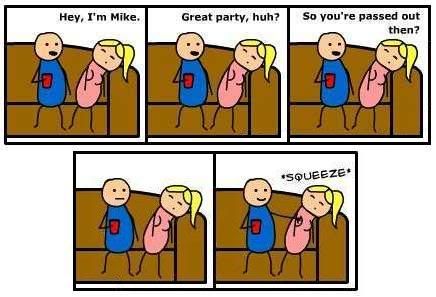WHAT DOES HIV DO?
HIV weakens an infected person's immune system which makes it easier to become ill with other ailments and infections. As the immune systme weakens and an infected person is not seeking consistent medical care or adhering to medication or treatm

ent, they can then develop AIDS (
acquired
immuno
deficiency
syndrome) or become "full blown". Sadly, for now, HIV and AIDS are a fact of life that cannot be eliminated, and is eliminating people we love.
AM I AT RISK?
Every 9.5 minutes, someone in the United States is infected with HIV. Anyone who comes in contact with an infected person's blood, semen, breast milk, or vaginal fluids in an open source is at risk for contracting HIV. The riskiest behaviors in contracting the virus are sharing needles to use drugs, receptive anal intercourse, and vaginal intercourse. HIV/AIDS knows no age, gender, ethnicity, class, height, lifestyle or religion. It is simply a disease that there is no cure for. It is however; statistically higher in youth and black heterosexual women.
Why are the youth more at risk?
Many young people have begun to or are approaching the age where they are preparing to leave home for college or planning for the future to live on their own, gaining independance and are meeting a lot of new people that will influence their decisions. Many of them are not physically, emotionally, or sexually mature in their growth to reach these new levels. College life offers more opportunities to develop sexual relationships as the students are around many like themselves who may be away from home for the first time.
HOW WILL I KNOW SOMEONE IS INFECTED?
You cannot tell by looking at someone if they are infected with HIV or not. A person can look and feel fine but still be infected with HIV. Many people who are infected are on a medical treatment to where the viral load in their immune system is undetectable; meaning there are fewer copies of the virus in the blood  than the tests can measure. While undetectable, a person can still have high measures of the virus in their semen and vaginal fluids and they can still pass it to someone in unprotected sex or sharing needles. The only true way to know if someone is infected is to get tested! Anonymous and/or confidential testing for HIV is offered by many medical clinics. Keep in mind that test results may not indicate that a person is HIV-positive until six months or more after infection which is called a "window period".
than the tests can measure. While undetectable, a person can still have high measures of the virus in their semen and vaginal fluids and they can still pass it to someone in unprotected sex or sharing needles. The only true way to know if someone is infected is to get tested! Anonymous and/or confidential testing for HIV is offered by many medical clinics. Keep in mind that test results may not indicate that a person is HIV-positive until six months or more after infection which is called a "window period".
WHAT IS THE SAFEST WAY TO AVOID GETTING HIV/AIDS?
The safest way to avoid many things that anyone may not be mature enough to handle including unwanted pregnancy, std/sti's, hiv/aids, broken hearts due to lack of trust, etc is to simply abstain from having sex. Many people choose this as a part of their lifestyle whether it be for personal, religious or health reasons. It is a choice made by those that realize sex is not a "must" or a rite of passage to experience things in life. One thing that a lot of people don't understand about abstinence is that even if you've engaged in sex in the pas

t, you can still make the choice to abstain and wait until you know you are ready - preferably when you are in a committed, monogomous relationship like marriage.
Many couples decide together to abstain which helps strengthen their relationship, build self-respect and open opportunities to really get to know each other beyond physical satisfaction. It is easier to make this decision early in the relationship before things get to a point where it becomes difficult to say no.
WHAT IF THAT DOESN'T WORK?
If you do choose to have sex, have SAFE sex! That doesn't just begin with a condom, it begins with being honest with your partner, remaining faithful to one another and refrain from shooting up drugs. Just one time is all it takes to be infected with HIV and other STD's.
BUT I ALWAYS USE CONDOMS, SO I'M SAFE RIGHT?
Condoms are NOT always 100% effective and the packaging clearly tells you that. When used properly, condoms can help protect you and your partner against HIV and other STD's as well as unwanted pregnancy; however... CERTAIN STDs CAN STILL BE SPREAD BY CONTACT WITH INFECTED AREAS THAT ARE NOT COVERED BY A CONDOM!! (See Genital Herpes Transmission).

HOW DO I USE A CONDOM PROPERLY?
First, discuss condom use before you have sex with your partner and agree that you will use them with every sexual encounter properly. This will also help you avoid any scare trips to the doctor due to being allergic to certain types of condoms.
Video: How to Put On A Condom
Health officials encourage you to use a male latex condom for each seperate act of vaginal, anal or oral sex; however if you cannot use a male latex condom, there are condoms for females as well.
Read the labels and instructions on the packaging carefully!
Check the expiration date.
Check the individually wrapped condom for a pocket of air inside. The condom wrapper should feel as though there is air inside, not flat.
Use a
water based lubricant for vaginal and anal sex. Never use condoms with oil based lubricants, such as petroleum jelly or with any vaginal products that may have oil. This causes the condom to be more porous, allowing semen and viruses to travel through the condom.
If
allergic to latex condom, there are also polyurethane or synthetic latex condoms. These types of condoms have not been as thoroughly tested as male latex condoms; however the CDC indicates that they're likely to provide similar protection.
I'M COOLER WHEN I'M HIGH
Using alcohol or anything that alters your sober mental state, including prescription drugs increases your risk for HIV infection (and only God knows what else!). A person's decision to say no or remain abstinent or faithful to their partner may be weakened if he re or she is using alcohol or other drugs. People with altered states of mind are more likely to forget to use condoms or may not use them properly.
re or she is using alcohol or other drugs. People with altered states of mind are more likely to forget to use condoms or may not use them properly.
HOW DO I AVOID THE TEMPTATION?
Pressure to party and engage in ccertain activities may seem like a reality in college life, single life, depressed life, etc. but it is important to protect yourself from high risk situations like gatherings centered around alcohol or other drugs. Avoid adding these two dangerous incentives to your dates as it can promote risky or violent behavior including date rape. Do not be afraid to say no and you can do so politely; however be firm. Aside from health issues, alcohol use or possession by people under the age of 21 can result in legal problems and it is important that you know the laws in your state as well as in other countries when traveling for holidays. Your schools, jobs or organizations you may be a part of might have rules about alcohol use by students or employees.
Learn to assert yourself, stand firm in your convictions of what you believe is best for you. Think ahead as sometimes certain stressors and pressures in life may make making decisions like abstaining from sex and refraining from drug use more difficult. It's easier to make these decisions when you think about consequences and decide on your limits and boundaries before getting into a situation involving alcohol, drug or sex. While it may be diffiult depending on the moment, try to always remain calm when choosing to say no and leave emotions out of your decision. Look the person in the eye and stand straight or sit up straight - try not to give nervous laughter or smiles as this may be interpreted as uncertainty. Use "I" statements instead of ridiculing the person who is choosing to be involved in high risk behavior. Say, "I have more fun when I'm not drinking", or "Drinking makes me sick", or "No thanks, I have a (test, interview, meeting) in the morning", instead of "You're a fool for drinking." As you should have your mind made up before you actually say no, stand firm and don't give in or argue your decision.
If still caught in the heat of the moment and temptation is in your face, learn to flip people's statements to where they can't respond:
But, everyone is doing it. / REPLY: I'm someone and I'm not doing it.
I thought you loved me. / REPLY: If you loved me, you wouldn't pressure me.
I'll still respect you in the morning. / REPLY: Good. I'll see you then.
This blog was written mostly for an informational purpose. As an individual living with HIV and someone who has been to many "sex education" classes in school, I feel that it would be less of me and what I believe in to not put my two cents in. First, I am a firm believer in abstinence. I was taught it growing up, I believe in the Bible and that all in it is what we should follow; however there are many factors to consider when thinking of who you are talking to as an audience when teaching abstinence. I do NOT believe it should be solely taught in schools. Things taught in schools should be reinforced in life beginning at home. If a student doesn't have someone at home or anyone they trust in their life to reinforce abstinence as an example of how to live, can you honestly expect them to adhere to it simply because you tell them to? While in some schools, the reasons WHY abstinence is the safest way to avoid HIV, STD's and unwanted pregnancy, there are less schools that provide or explain (notice I didn't say HAND OUT) the tools available to individuals who choose to not abstain OR for individuals who may get in a situation or even live in a situation where they don't have a choice. I feel that you can't tell someone not to do something without telling them why or without explaining how to protect themselves should something unforseen occur. Yes, in the book of Genesis, Adam and Eve were given specific instructions and then didn't follow them and NO I'm not saying God should have given them candied apple so that they wouldn't have been tempted. I'm saying that because the source of original sin went down the way it did, it caused a ripple effect of more sin. We were then at that point, given free will and our free will has caused deaths, heartache, wars, poverty, greed, etc. and we all have ways to avoid things that are not good for us. Even then... Eve could have had anything else in the Garden of Eden. We can do ANYTHING else besides put ourselves at risk for HIV, STDs and unwanted pregnancy; however we let our flesh (hormones/peer pressure) get the best of us. So if we must be that weak we should at least utilize the methods that are available to us so that we can take advantage of the chances given to us to do better each day.

Also, as well as there are rules regarding proper usage of condoms, there is education on proper disposal of condoms. Do NOT flush them down the toilet!! Do NOT throw them under the bed or couch or car seat. Do NOT use them more than once. Upon removal of used condom, roll in tissue along with wrapper (if it can be found - I know how it is sometimes), and place in trash can. If there is concern of embarrassing discovery later, be sure to dispose of outside. I don't know anyone that digs through their bathroom trash can, this seems like a pretty safe place to throw a condom away.
I thank you for taking the time to read this lengthy blog and will soon return to my personal rants on being HIV positive and trying to keep others from getting it too!













